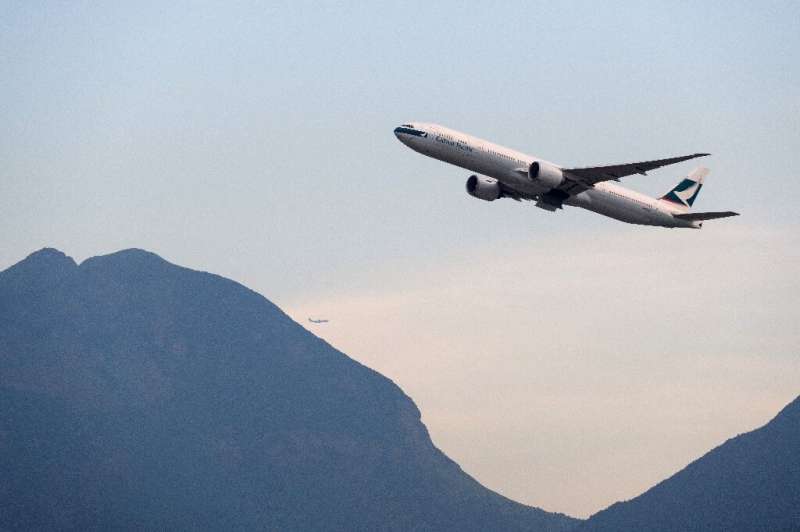Like many carriers hammered by the global pandemic, Cathay has seen passenger numbers evaporate in recent months, leaving most of its fleet sitting on the tarmac and the firm haemorrhaging cash
Shares in Cathay Pacific ended lower Wednesday, having soared nearly 19 percent at the open, a day after the airline announced a multibillion-dollar government-led bailout plan.
The firm on Tuesday became the latest carrier to ask for government help to get it through the coronavirus crisis, which has hammered the aviation industry as passenger numbers evaporate, leaving fleets sitting on the tarmac and companies haemorrhaging cash.
The HK$39 billion ($5 billion) rescue will see Hong Kong's government pumping cash into Cathay in return for a six percent stake and two representatives on its board.
Trading in the firm's shares were halted Tuesday ahead of the announcement but they soared 18.73 percent to HK$10.46 on resuming Wednesday, before sharply retreating within minutes and ending 1.02 percent down at HK$8.72.
Traders said a rush to cover short positions was behind the brief surge, according to Bloomberg News.
The bulk of the capital will come from new shares issued to Aviation 2020, a company owned by the government, as well as a HK$7.8 billion bridging loan from the government.
Under the proposal, Cathay will raise about HK$11.7 billion in a rights issue, while preference shares will be sold to the government for HK$19.5 billion and warrants for HK$1.95 billion, subject to adjustment.
Cathay said its executives had also agreed to pay cuts, while all staff would be asked to take three weeks unpaid leave over the next six months—a second time they have been asked to do so.
The airline was already under pressure after taking a hit from months of sometimes violent protests in Hong Kong last year that saw tourism battered.
It also found itself punished by Beijing last year when some of its 33,000 employees expressed support for Hong Kong's pro-democracy protests.
"Financially this gives them probably enough for a year to two years," Sobie Aviation's Brendan Sobie told Bloomberg Television on Wednesday. "This is just one step to survive the crisis."
The bailout is the first time Hong Kong's government has directly injected money into a private company.
Finance Secretary Paul Chan said the move was to protect Hong Kong's status as a lucrative international transport hub, adding that the government saw the investment as temporary and one they hoped taxpayers would see a return on.
Before the pandemic struck, Cathay was one of Asia's largest international airlines and the fifth largest air cargo carrier globally.
Healy said Cathay went into the year with some $20 billion in reserves but it was now burning through $2.5-3 billion a month.
Its share price this year has fallen 22 percent.
It is not alone. Airlines are in line to make a combined net loss of more than $84 billion this year thanks to the coronavirus, the International Air Transport Association said Tuesday.
© 2020 AFP























